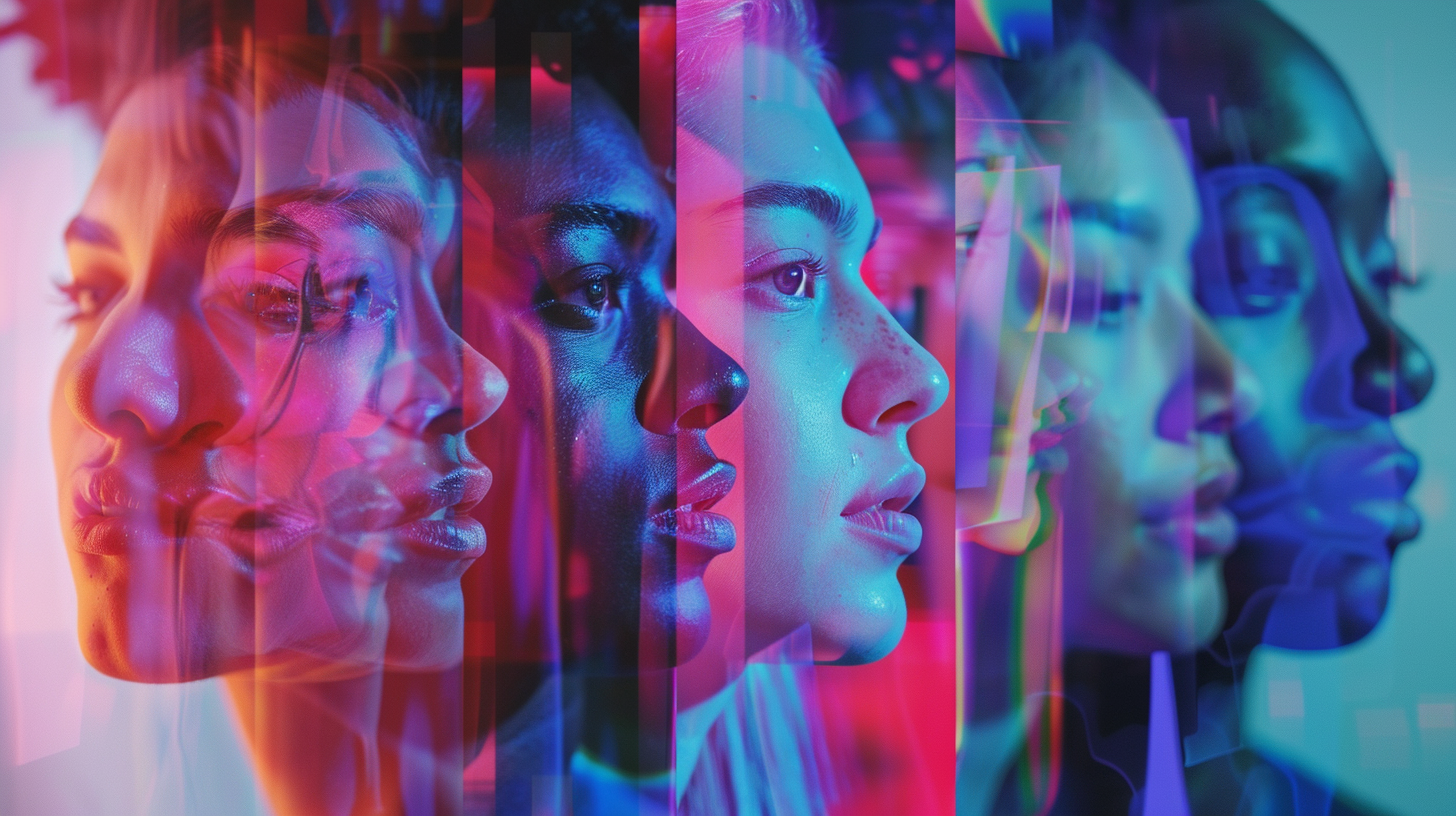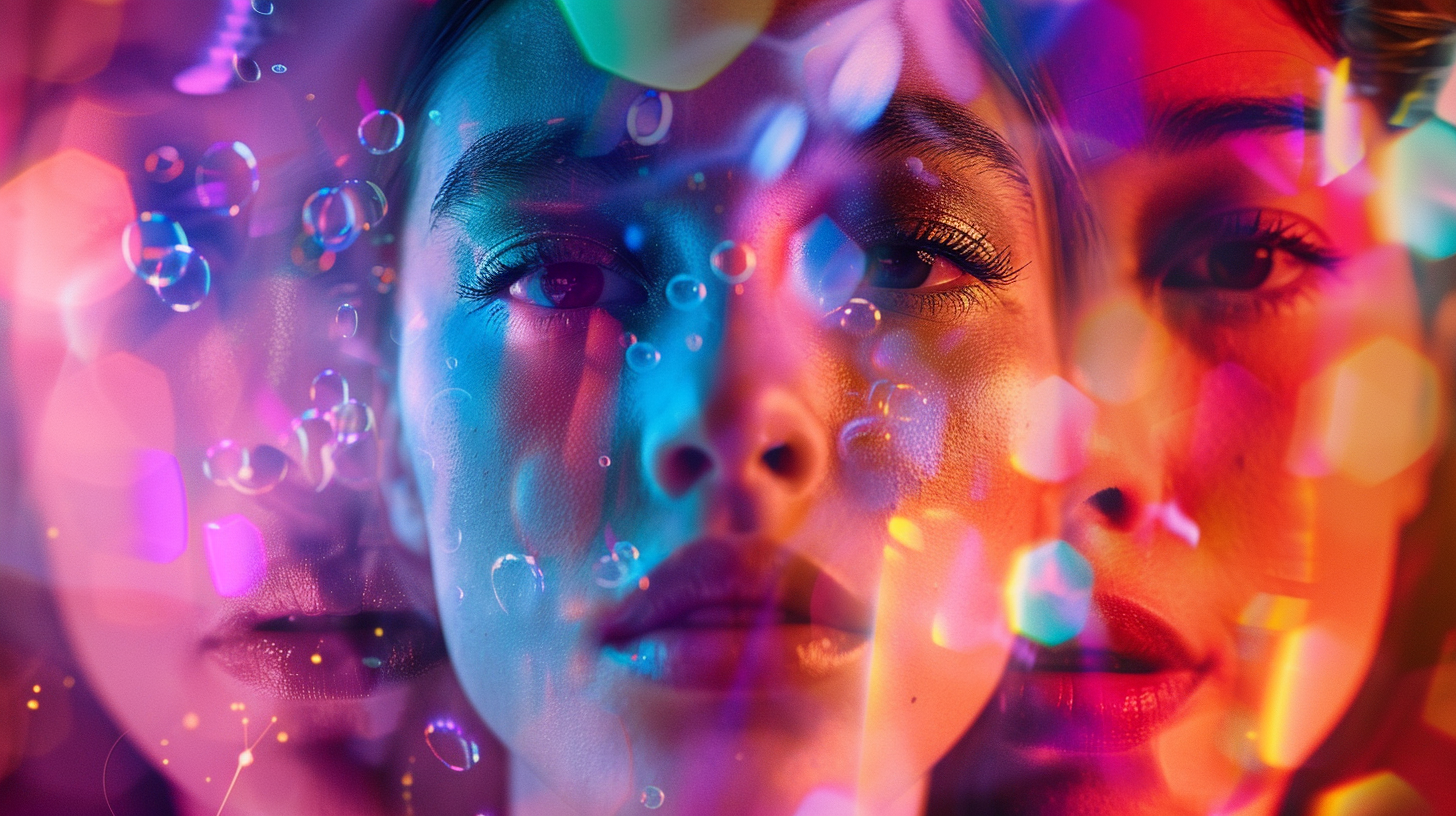The Rise of Authenticity: Influencer Marketing Trends Taking Over 2025
Discover how authenticity is revolutionizing influencer marketing in 2025. From micro-influencers driving 44% brand preference to AI-powered personalization and social commerce integration—explore key trends reshaping digital advertising strategies and consumer trust.

Get the marketing insights that transform brands and drive real impact.
Join thousands of leaders discovering how strategic excellence meets social change.
Every week, get battle-tested strategies from 14+ years bridging Fortune 500 boardrooms and nonprofit frontlines. From luxury brand campaigns to life-saving initiatives, discover the frameworks that turn marketing into meaningful change—whether you're driving profit, purpose, or both.
What if the future of influencer marketing isn't driven by follower count, but by genuine connections and cultural resonance? As we step into 2025, the creator economy and influencer marketing landscape calls for authenticity over sheer reach, marking a significant shift towards influencer marketing campaigns that genuinely connect with target audiences across social platforms, digital advertising channels, and innovative marketing technology solutions. This evolution reflects a growing belief: true influence transcends superficial metrics, embodying genuine values and consumer trust through strategic influencer partnerships, meaningful brand collaborations, effective influencer marketing strategies, and comprehensive social media marketing approaches.
Central to this transformation is the focus on authenticity in influencer marketing within digital marketing, content strategy, brand partnerships, and influencer collaborations. Nano influencers and micro-influencers—social media influencers with smaller yet more loyal audiences—are leading the charge for meaningful audience engagement, community building, stronger brand relationships, and effective consumer behavior analysis. These influential real people promote content that truly mirrors the shared values of their communities while maintaining high engagement rates, fostering deeper relationships, driving brand awareness through authentic storytelling, and supporting comprehensive marketing strategies. Furthermore, ethical communication and clear compensation practices in affiliate marketing, sponsored posts, sponsored content, and brand partnerships build consumer trust, breaking down performative facades for genuine interaction, authentic brand storytelling, effective social proof, and measurable marketing ROI.
In exploring the changing landscape of the creator economy, we see the integration of advanced technology like AI influencers and the emergence of virtual influencers transforming digital marketing strategies, social media strategy, campaign management approaches, and influencer campaigns. Meanwhile, the strategic move from short-lived collaborations to long-term partnerships, brand ambassadorships, and sustainable influencer partnerships reflects a broader understanding across the influencer marketing industry: strong relationships bring lasting results and achieve campaign goals through sustained influencer collaborations, effective performance metrics, strategic customer acquisition efforts, comprehensive marketing analytics, and data-driven consumer engagement strategies. Dive into this comprehensive guide to uncover the key trends shaping a future where authenticity prevails, and effective influencer marketing strategies act as a catalyst for genuine consumer-brand relationships while driving measurable marketing ROI, enhanced user experience, sustainable customer engagement, effective brand storytelling, and innovative content marketing approaches.
Emerging Influencer Marketing Trends Reshaping Brand Strategies in 2025
In 2025, influencer marketing strategies, digital advertising approaches, and comprehensive social media marketing will pivot towards long-term collaborations and strategic partnerships over one-off campaigns, nurturing deeper connections and consumer trust between brands and target audiences through effective campaign management, strategic influencer outreach, and advanced marketing automation. Multi-platform campaigns, cross-platform marketing, comprehensive social media strategy, and integrated digital marketing will be essential, extending influence across various social platforms to enhance reach, audience engagement, and impact through the creator economy, digital marketing ecosystems, viral content opportunities, and user-generated content strategies.
The metaverse and virtual experiences will emerge as groundbreaking avenues for engaging younger, tech-savvy audiences through immersive virtual events, branded shopping experiences, innovative user experience design, and cutting-edge marketing technology, expanding the boundaries of traditional marketing, social commerce, digital advertising, and consumer behavior analysis. Performance-based partnerships, data-driven marketing approaches, advanced performance metrics, and comprehensive marketing analytics will gain traction, with brands shifting budgets towards commission-based models instead of flat fees, promoting accountability and measurable campaign goals through advanced marketing analytics, ROI measurement, customer acquisition tracking, and strategic brand awareness initiatives.
Key tools like Creator Marketplaces, influencer marketing platforms, campaign management systems, and advanced marketing technology will become paramount, fostering lasting relationships between social media influencers and brands that prioritize authenticity and audience engagement over pure follower count metrics, vanity metrics, and traditional performance indicators. These platforms support effective influencer outreach, streamlined brand partnerships, comprehensive content strategy development, marketing automation, and data-driven analytics for sustainable influencer marketing campaigns, enhanced social proof, and optimized customer engagement.
Why Authenticity in Influencer Marketing is Driving Consumer Behavior in 2025
In the evolving landscape of influencer marketing, digital influence, content marketing, and comprehensive social media marketing, authenticity in influencer marketing has risen to the forefront, especially as we move towards 2025. Gen Z and millennial consumers, in particular, are driving this shift by demanding purpose-driven content from brands and real people alike that demonstrates social responsibility, genuine brand values, effective social proof, and meaningful consumer engagement through authentic influencer marketing campaigns, strategic brand partnerships, and innovative content strategy approaches. This demographic possesses sophisticated filters for marketing tactics and highly values genuine, meaningful interactions over mere product promotions through traditional affiliate marketing channels, sponsored posts, sponsored content, conventional digital advertising approaches, and standard marketing automation processes.
Authenticity isn't just about what brands sell but about the values they represent, creating an imperative for brands to align with societal causes that resonate with their target audiences and reflect contemporary social issues through strategic content strategy, community building efforts, effective brand storytelling, comprehensive social media strategy, and data-driven consumer behavior analysis. Therefore, establishing genuine connections through long-term collaborations, strategic influencer partnerships, effective influencer outreach, sustainable brand partnerships, and innovative marketing technology has become a strategic focus in the creator economy, emphasizing consumer trust and transparency as key components for audience engagement, brand loyalty, sustainable customer acquisition, measurable marketing ROI, and comprehensive performance metrics. These trends underscore the importance of authenticity as not just a marketing tactic, but a fundamental expectation from today's consumers across social platforms, digital touchpoints, comprehensive influencer marketing campaigns, user-generated content ecosystems, and integrated brand experiences.
The narrative has shifted from selling products to telling stories that connect deeply with audience emotions and values through the creator economy, content marketing strategies, and comprehensive brand storytelling, prioritizing engagement rates, meaningful interactions, effective social proof, and human connection over traditional follower count metrics, surface-level reach, and conventional performance metrics.
How Micro-Influencers and Nano Influencers Are Revolutionizing Brand Partnerships
Nano influencers and micro-influencers are emerging as powerful forces within the realm of influencer marketing, digital influence strategies, targeted content marketing, and comprehensive social media marketing initiatives. Unlike larger influencers, these real influencers, with follower counts typically ranging from 1,000 to 100,000, boast highly engaged audiences that value genuine connections, authentic recommendations, meaningful brand relationships, effective social proof, and transparent brand partnerships over sheer numbers and conventional social proof metrics. In 2025, brands increasingly recognize the potential of these nano influencers, micro-influencers, and specialized brand ambassadors to maintain authentic relationships with niche communities and specialized target audiences across social platforms through strategic influencer outreach, community building initiatives, innovative content strategy, and data-driven marketing analytics.
This shift in focus is reflected in the 44% of brands choosing nano-influencers as preferred partners (up from 39%), highlighting the creator economy's evolution toward quality audience engagement, meaningful brand partnerships, effective customer acquisition strategies, comprehensive performance metrics, and optimized marketing ROI. Such micro-influencers offer a more personal connection, fostering loyalty and consumer trust instead of merely reaching a large number of followers through traditional follower count strategies, mass-market approaches, conventional marketing campaigns, standard digital advertising, and basic social media marketing techniques.
In essence, the rise of nano influencers emphasizes a strategic move towards cultivating meaningful community connections, niche audience engagement, effective customer acquisition, targeted brand partnerships, and comprehensive consumer behavior analysis rather than prioritizing reach alone through traditional digital advertising and standard marketing automation. This approach aligns with the broader industry trend of valuing quality engagement rates, authentic connections, comprehensive performance metrics, strategic marketing analytics, and data-driven social media marketing, marking a departure from traditional influencer models focused on follower counts, vanity metrics, surface-level social proof, and conventional brand awareness tactics. Brands leveraging these partnerships can tap into highly engaged communities through Creator Marketplaces, specialized platforms, strategic campaign management, innovative marketing technology, and advanced marketing automation, gaining advocates who are perceived as credible voices within these circles while achieving specific campaign goals, driving authentic brand awareness, supporting viral content creation opportunities, enhancing user-generated content strategies, and maximizing overall marketing ROI through sustainable influencer partnerships.

The Psychology Behind Genuine Content Creation That Drives Consumer Trust
The significance of genuine content creation in influencer marketing, digital storytelling, comprehensive content strategy, and integrated social media marketing cannot be overstated. It plays a crucial role in building consumer trust and influencing purchasing decisions, with 49% of consumers making regular purchases due to influencer posts on their buying habits over traditional affiliate marketing approaches, conventional digital advertising methods, standard marketing campaigns, and basic marketing automation systems. Aligning social media influencer material with both the influencer's unique style and the brand's ethos is essential for establishing connections that resonate with target audiences across social platforms, digital channels, integrated user experience touchpoints, comprehensive brand storytelling initiatives, and strategic consumer engagement strategies.
In 2025, consumers are increasingly seeking content that is not only original and entertaining but also authentic and transparent, reflecting social responsibility values, genuine brand partnerships, effective content marketing, strategic social media marketing, and innovative marketing technology within the creator economy and broader digital advertising landscape. Creating genuine content involves transparency and the open sharing of experiences, which fosters consumer trust and drives higher engagement rates, improved performance metrics, enhanced customer acquisition, comprehensive marketing analytics, data-driven consumer behavior insights, and sustainable marketing ROI compared to purely promotional material, traditional advertising content, conventional marketing campaigns, standard brand awareness tactics, and basic digital marketing approaches.
Authenticity becomes a decisive factor for consumers when selecting influencers to follow, as highlighted by global surveys where consumers prioritize authenticity traits over follower count metrics, traditional influence indicators, conventional social proof measures, and standard brand awareness tactics. Therefore, effective influencer marketing strategies, comprehensive content strategy, effective campaign management, strategic social media marketing, and innovative marketing technology must incorporate genuine storytelling and full disclosure in affiliate marketing partnerships, sponsored content, brand collaborations, influencer campaigns, and strategic brand partnerships, ensuring target audiences perceive their interactions as credible and trustworthy through transparent influencer marketing campaigns, authentic brand storytelling, and comprehensive consumer engagement initiatives. This humanized approach to brand interactions, customer engagement, user experience, strategic marketing analytics, and data-driven consumer behavior analysis is becoming more critical, as consumers demand content that aligns with their values and lifestyles while supporting campaign goals that demonstrate social responsibility, authentic brand messaging, measurable ROI through strategic performance metrics, effective marketing automation, and sustainable brand partnerships.
Building Consumer Trust Through Transparency in Influencer Marketing Campaigns
In the evolving landscape of the creator economy and digital marketing, transparency has emerged as a cornerstone for building consumer trust and credibility. Real people today demand more than just catchy slogans or engaging content—they seek honest opinions and authentic brand storytelling from the brands and social media influencers they support across social platforms and digital touchpoints. This shift from passive content consumption to a desire for authenticity is fueling a rapid transformation in influencer marketing strategies and brand partnerships.
Brands are increasingly prioritizing performance-based partnerships and data-driven approaches, where they emphasize transparency in how success is measured and communicated through engagement rates, conversion metrics, and authentic audience interactions rather than just follower count and surface-level metrics. As influencer marketing budgets and digital marketing investments continue to grow, transparency and authenticity are not just key trends but foundational elements driving strategic decisions within the creator economy, particularly in affiliate marketing relationships and sponsored content that target specific audience segments and niche communities.
Clear Communication of Influencer Compensation
One of the most critical aspects of maintaining transparency in influencer marketing and sponsored content is the clear communication of compensation and brand partnerships. By explicitly stating compensation arrangements, such as using terms like "Paid partnership with [brand]" or hashtags like #ad, #sponsored, and #partnership, social media influencers help enhance consumer trust with their target audiences and maintain ethical standards. This clarity is not merely a best practice but a legal necessity in many jurisdictions, serving to maintain the integrity of influencer marketing and affiliate marketing partnerships while supporting regulatory compliance.
Consumers are increasingly appreciative of real influencers who are upfront about their compensation practices and brand relationships, with 47% acknowledging that transparency contributes to perceptions of authenticity within the creator economy and digital influence landscape. Ensuring that social media influencers disclose their financial arrangements and brand partnerships helps preserve consumer trust and establishes a collaborative ethos between audiences and influencers across social platforms, ultimately supporting long-term campaign goals and sustainable brand relationships.
Ethical Practices in Content Promotion
Ethical promotion practices and responsible marketing are fundamental to creator marketing, requiring a concerted effort from both content creators and brands to demonstrate social responsibility and maintain authentic brand values. The commitment to transparency and authenticity helps navigate the ethical challenges that arise as the creator economy matures and digital marketing evolves. Content creators must recognize the responsibility that comes with their platform and audience influence, ensuring ethical content promotion aligns with genuine values and consumer expectations while maintaining high engagement rates and authentic community connections.
Meanwhile, brands must collaborate with content creators who share similar values and adhere to ethical guidelines and regulatory requirements to maintain standards across social media platforms and digital marketing channels. This approach not only builds consumer trust but also enhances the overall credibility of creator marketing efforts within the broader creator economy and influencer marketing industry. As the industry evolves, addressing these ethical challenges carefully ensures it remains a positive force in advertising and digital marketing, fostering a culture of honesty and reliability while achieving meaningful campaign goals and sustainable brand growth.
The influencer marketing industry continues to evolve rapidly, with spending projected to exceed $32 billion in 2025. As brands navigate this authentic-first landscape, success will increasingly depend on building genuine relationships with creators who share their values and can authentically connect with target audiences through transparent, value-driven content.

Technological Advancements in the Creator Economy
In 2025, the creator marketing landscape, digital marketing ecosystem, content strategy environment, and comprehensive social media marketing infrastructure are undergoing a profound transformation through technological advancements, marketing innovation, strategic campaign management solutions, and cutting-edge marketing automation platforms. Artificial intelligence (AI), digital innovation, advanced marketing technology, and data-driven marketing analytics are at the forefront, redefining how brands interact with their target audiences and optimize marketing campaigns across social media platforms, digital channels, comprehensive user experience touchpoints, strategic brand partnerships, and integrated consumer engagement ecosystems. This evolution is not just about enhancing efficiency; it's about creating more meaningful and engaging shopping experiences for consumers within the creator economy while leveraging marketing technology, data analytics, performance metrics, strategic influencer outreach, comprehensive brand storytelling, and innovative content marketing for measurable customer acquisition, enhanced brand awareness, sustainable marketing ROI, and optimized consumer behavior analysis.
As AI continues to integrate into effective influencer marketing strategies, digital marketing approaches, comprehensive content marketing systems, social media marketing platforms, and advanced marketing automation solutions, brands are poised to meet consumer expectations for personalization, convenience, and authenticity more effectively than ever before, while maintaining focus on engagement rates, meaningful interactions, effective social proof, viral content opportunities, user-generated content strategies, strategic brand partnerships, and sustainable influencer campaigns over traditional follower count metrics, vanity measurements, and surface-level performance indicators.
The Power of AI-Driven Personalization in Influencer Campaign Management
Artificial intelligence (AI) and machine learning are revolutionizing how brands approach influencer marketing by offering unprecedented levels of personalization and predictive capabilities within the creator economy and digital marketing landscape. AI tools and marketing technology are empowering marketers to not only discover real people who align perfectly with brand values and target audiences but also forecast campaign outcomes with greater accuracy across multiple social platforms and digital touchpoints.
By analyzing vast datasets and consumer behavior patterns, AI enables brands to tailor campaigns precisely to match consumer preferences, enhancing audience engagement through targeted and resonant interactions that prioritize authentic connections and meaningful brand relationships over follower count and surface-level metrics. It is transforming the efficiency of influencer marketing by streamlining content creation processes, optimizing content through strategic post timing, versatile hashtag strategies, and enhanced sentiment analysis to create narratives that genuinely connect with audiences and achieve specific campaign goals while maximizing marketing ROI.
As brands leverage AI-driven personalization and marketing automation, they are reshaping consumer relationships within the creator economy, ensuring their influencer marketing efforts resonate not just on a transactional level but also an emotional and socially responsible one, reflecting a modern approach to authenticity that builds consumer trust through meaningful audience engagement and data-driven insights.
Virtual Influencers vs Human Influencers: The Rise of AI-Generated Brand Ambassadors
The emergence of virtual influencers and AI influencers marks a significant trend in influencer marketing and digital innovation, capturing the imagination of target audiences worldwide through computer-generated imagery (CGI) and AI technologies. Names like Lil Miquela, Imma, and Noonoouri are at the forefront of the creator economy and virtual marketing, seamlessly integrating into real-world brand interactions, securing deals in fashion shows, and starring in campaigns that were once the domain of human influencers and traditional real people.
These digital personas and virtual brand ambassadors operate within virtual worlds and gaming environments, offering unique, creative, and immersive shopping experiences that transcend traditional follower count limitations and conventional marketing boundaries. Virtual influencers achieve 3x higher engagement rates than traditional human influencers, with Lil Miquela earning approximately $10,000 per Instagram post and boasting partnerships with Calvin Klein, Prada, and Samsung. As the metaverse solidifies its place in everyday digital interactions and social commerce, virtual influencers will play increasingly pivotal roles, allowing brands to engage target audiences beyond the traditional limitations of human dynamics across social platforms and digital ecosystems.
AI influencers and virtual influencers offer unparalleled creative control and brand consistency, enabling brands to maintain consistent messaging 24/7 while providing personalized interactions at scale within the creator economy and digital marketing landscape. They present a new frontier in influencer marketing, where the boundaries of creativity and audience engagement are pushed beyond traditional limits to form wholly unique digital connections that can achieve specific campaign goals while maintaining high engagement rates and authentic brand storytelling.
Shift Towards Long-Term Partnerships in the Creator Economy
In the influencer marketing landscape of 2025, brands are increasingly favoring long-term partnerships and strategic collaborations over short-term collaborations within the broader creator economy and influencer marketing industry. This shift is fueled by the recognition that sustainable, ongoing relationships foster deeper connections and genuine advocacy between brands and their influencer partners across social platforms and digital marketing channels.
By transitioning away from transactional, one-off campaigns and short-lived promotional efforts, brands can build meaningful engagements with target audiences, positioning social media influencers as integral parts of their marketing strategy rather than temporary affiliate marketing partners or occasional brand collaborators. This trend underscores the movement towards brand ambassadorships and long-term influencer partnerships, where real people are consistently involved in crafting a brand's narrative, thereby enhancing authenticity and consumer trust while achieving long-term campaign goals and sustainable brand growth.
Building Trust and Genuine Connections
Authentic creator marketing and genuine brand partnerships hinge on building consumer trust and cultivating genuine connections with target audiences and niche communities. This is achieved by weaving personal stories and relatable experiences into brand narratives, fostering transparency and openness across social media platforms and digital storytelling channels. As content creators disclose their partnerships and share their authentic connections with the brands, they bridge the gap between consumers and companies, leading to increased credibility within the creator economy and enhanced brand reputation.
This approach does not only elevate brand reputation but also strengthens community loyalty through sustained audience engagement that prioritizes authentic connections and meaningful interactions over follower count metrics and traditional influence measurements. The rise of deinfluencing—where audiences demand sincerity over superficiality—further emphasizes the importance of honesty in creator partnerships and authentic brand relationships, compelling brands to prioritize transparency in their marketing strategies while demonstrating social responsibility and genuine brand values.
Benefits Over One-Off Campaigns
Long-term collaborations and strategic partnerships with content creators offer a plethora of benefits that one-off campaigns and short-term promotional efforts simply cannot match within the creator economy and sustainable marketing approaches. Such partnerships foster an atmosphere of consumer trust and authenticity, as content creators seamlessly integrate brand messaging into their regular content across social media platforms and daily audience interactions. This natural fit transforms content creators into genuine advocates and brand ambassadors, amplifying brand trust and consumer loyalty while maintaining high engagement rates and authentic community connections.
Target audiences and niche communities benefit too, as they see ongoing collaborations as a testament to a content creator's genuine belief in the product and authentic brand relationship, which in turn boosts audience engagement and brand affinity beyond traditional follower count considerations and surface-level metrics. Many content creators prefer this approach within the creator economy, finding that consistent partnerships allow for more creativity and authentic content creation that aligns with their personal brand and values while supporting long-term brand storytelling.
This deeper connection, nurtured over time through sustained partnerships, generates lasting impressions that effectively strengthen the bond between brands and their target audiences, ultimately leading to sustained success in influencer marketing efforts while achieving meaningful campaign goals that demonstrate social responsibility and drive measurable marketing ROI.
The B2B Influencer Marketing Revolution: How Professional Networks Drive Business Growth
By 2025, the realm of B2B influencer marketing and professional influencer partnerships is forecasted to undergo substantial growth, largely driven by social platforms like LinkedIn within the professional creator economy and business marketing landscape. As businesses increasingly seek authentic connections and thought leadership opportunities, they are leveraging the power of effective influencer marketing strategies to foster longer-term partnerships with industry thought leaders and real people who specialize in educational content and professional insights.
This approach not only builds deeper relationships but also ensures sustained audience engagement with target audiences and professional communities, crucial elements for nurturing brand affinity among professional networks and industry decision-makers. Even companies with more constrained influencer marketing budgets find this approach attractive due to its flexibility and high potential return on investment, particularly when focusing on engagement rates and authentic connections rather than follower count metrics and traditional B2B marketing approaches.
As of 2023, a telling 75% of B2B enterprises were already utilizing influencers and industry thought leaders to effectively communicate their offerings and connect with key decision-makers through Creator Marketplaces and professional networks. The focus of key trends within this sphere is on transparency and authenticity, encouraging real people to provide honest opinions and credible endorsements that cultivate consumer trust among professional audiences while maintaining social responsibility standards and ethical business practices.
LinkedIn's Transformation: How Thought Leader Ads Are Changing B2B Marketing
As the B2B influencer marketing landscape evolves, LinkedIn is positioning itself as a transformative force within the professional creator economy and business networking environment. Known for its professional environment and thought leadership opportunities, LinkedIn is increasingly recognized for its investment in real people and new features like short-form videos and Thought Leader Ads that cater to target audiences seeking educational content and industry insights.
These developments are making the platform an indispensable tool for B2B campaigns and effective influencer marketing strategies within professional networks. Thought Leader Ads deliver 1.7x higher click-through rates and 1.6x higher engagement compared to standard sponsored content, demonstrating LinkedIn's expansion into the influencer market and its potential to engage professional audiences more effectively through authentic connections and high engagement rates while supporting business objectives.
LinkedIn is becoming a crucial channel for brands aiming to connect with businesses through the creator economy and professional marketing strategies. It provides an ideal setting for B2B influencer marketing, enhancing direct audience engagement between industry professionals and brands while maintaining focus on authentic connections and thought leadership rather than follower count and traditional metrics. As LinkedIn continues to innovate and invest in features for real people and professional content tools, its ability to facilitate substantial business conversations and industry discussions is becoming evident.
This positions LinkedIn not only as a platform for individual professionals but as a pivotal space for B2B influencer marketing and professional brand building, enabling brands to leverage thought leadership and educational content that resonates with key decision-makers while achieving specific campaign goals through Creator Marketplaces and professional networking opportunities.
Proven B2B Engagement Strategies That Generate Actionable Business Results
Establishing credibility and consumer trust is fundamental to successful B2B influencer marketing and professional brand partnerships, and leveraging relationships with industry experts and thought leaders is crucial within the professional creator economy and business marketing landscape. Collaborations often center around creating educational content, such as webinars and white papers, that assists target audiences in making informed purchasing decisions while maintaining high engagement rates and providing genuine value to professional communities.
These strategic engagements highlight the importance of using knowledgeable industry experts and thought leaders who can authentically communicate product benefits and actionable insights across social platforms and professional networks. Partnering with real people whose demographics and values align closely with a brand's target audience is key for effective outreach within the creator economy and B2B marketing strategies.
Encouraging influencers to genuinely experience and review products can further enhance B2B engagements, fostering consumer trust and authenticity while demonstrating social responsibility and genuine product value. As the market evolves, authentic endorsements and honest opinions are becoming essential in persuading professional audiences, moving beyond traditional follower count metrics to focus on meaningful audience engagement and credible industry insights.
With LinkedIn's expanding role and professional content focus, the platform offers a robust environment for driving critical business discussions through the creator economy and professional marketing initiatives. By emphasizing educational content that informs and educates professional audiences, brands can effectively position themselves as thought leaders and innovators while building authentic connections with target audiences and achieving specific campaign goals through strategic partnerships with industry experts and thought leaders.

Social Commerce Revolution: How Influencers Are Transforming E-commerce Sales
The integration of social commerce into influencer marketing marks a pivotal evolution in the 2025 landscape, blurring the lines between social media interaction and the shopping experience within the broader creator economy and digital retail environment. Social platforms like TikTok, Instagram, and YouTube have embraced this trend, combining entertainment and e-commerce to create immersive shopping experiences that prioritize audience engagement and seamless purchase journeys over traditional follower count metrics and conventional retail approaches.
This transformation emphasizes a seamless transition from inspiration to purchase, turning target audiences' engagement into immediate transactions through Creator Marketplaces and integrated shopping features while supporting social commerce growth. With tools like shoppable live streaming and integrated shopping options, these platforms facilitate real-time product showcasing and direct purchase opportunities, capitalizing on the impulsive nature of consumers while building consumer trust and authentic brand relationships.
As social commerce becomes a dominant force within the creator economy and digital retail landscape, it not only enhances convenience but also promises increased audience engagement and revenue potential for brands willing to innovate their effective influencer marketing strategies while maintaining authentic connections with their target audiences and driving measurable marketing ROI.
From Inspiration to Purchase: How Influencers Drive E-commerce Growth
The e-commerce industry and digital retail sector see creators not just as brand ambassadors but as vital conduits for driving digital sales and establishing sustainable consumer relations within the creator economy and online shopping ecosystem. With the expansion beyond traditional big-name influencers to a broader spectrum of micro-influencers, beauty influencers, and niche specialists, brands now access more diversified target audiences and specialized communities across social platforms and digital marketing channels.
Predictive analytics and marketing technology play a crucial role in this growth, allowing brands to craft campaigns with anticipated successful outcomes, enhancing audience engagement and sales strategies while maintaining focus on engagement rates and meaningful customer interactions rather than follower count and vanity metrics. Moreover, transparency in influencer marketing breeds authenticity, which is increasingly demanded by savvy consumers who value social responsibility and genuine connections in their online shopping experiences.
As a result, marketers are turning to novel practices such as AI influencers and virtual influencers to provide controllable and scalable campaigns that achieve specific campaign goals while supporting e-commerce growth. This strategic evolution in influencer marketing not only optimizes e-commerce growth but also revolutionizes customer interaction and digital shopping experiences, making its deployment essential in the modern marketing arena while fostering consumer trust through authentic connections and Creator Marketplaces.
The Future of Shopping: Creating Seamless Social Commerce Experiences
In the realm of social commerce within the creator economy and digital retail innovation, creating seamless shopping experiences is key to future customer acquisition and retention across social platforms and e-commerce channels. Platforms like TikTok Shop and YouTube Shopping streamline the purchase journey by allowing users to buy products directly through the platform, eliminating the barriers between discovery and acquisition while maintaining authentic connections with real people and genuine product recommendations.
This fluency in the shopping process is further heightened by live shopping events and interactive commerce experiences that intertwine entertainment with commerce, prioritizing audience engagement and consumer trust while creating memorable brand experiences. During these events, content creators take on the role of shopping hosts and product ambassadors, engaging with their target audiences in real-time and boosting the authenticity, trust, and immediacy of the shopping experience beyond traditional follower count considerations and conventional retail approaches.
By embedding these seamless transitions in their digital strategies and e-commerce optimization, brands enhance conversion rates and consumer satisfaction while achieving campaign goals that demonstrate social responsibility and genuine customer value. This approach secures their footing in the evolving digital retail landscape through the creator economy, utilizing Creator Marketplaces and performance-based partnerships to create authentic connections that drive meaningful audience engagement and measurable results across social media platforms while supporting sustainable business growth and customer loyalty.






